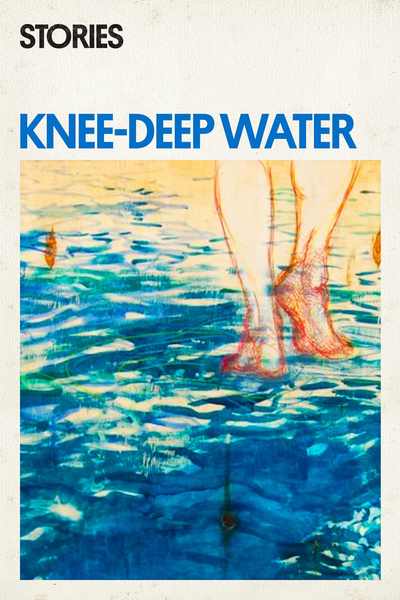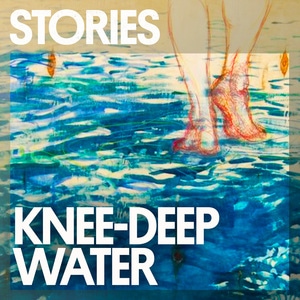Marin walked slowly through the knee-deep water. Her skimmer dragged behind her, tied to her waist with a rope. It was too shallow to use now. Besides, there was no wind. So Marin walked.
All around her, for miles and miles in every direction, was water. Flat, shallow, crystal blue water. But that didn’t bother Marin. Water was what she knew. Water was what they all knew. On Kai, water was practically all there was.
Small fish swam around Marin’s sandaled feet, though she hardly noticed. She continued to walk forward—the gentle sun beating down on her—as if it were the only thing she could do. Occasionally, the skimmer dragging behind her snagged on a rock, forcing her to turn around to pull it free. The small sailboat was perfect for traversal through the wavelands. On a good day, when the tides were right and the wind favored you, you could travel more than three times as fast on a skimmer. But today, speed was not a priority for Marin. So she walked, skimmer tied to her waist, dragging behind her.
On Kai, where the water expanded in every direction, it was important to pay attention to the tides. Though the water could be as low as ankle-deep in the mornings, it could quickly rise to chest-deep by the afternoon. That was why it was important to keep a skimmer. You couldn’t survive for long at high tide, this far away from a village.
But now the water was only knee-deep, so Marin walked. She was used to it, used to being so far from the village. As a fisher, she spent many long days miles from the village, hunting her prey. She was pretty good at it too. The harpoon she kept strapped to the side of her skimmer had killed thousands of fish. The net she kept in the skimmer’s storage box had captured entire schools. She was frequently the top catch of her village. They relied on her.
Marin wasn’t sure which she preferred more: her time spent in the village or her time spent alone in the water. Of course, the water was still in the village as well. You didn’t escape the water, simply built on top of it. Her small but bustling village was built on a network of rafts, constructed of wood salvaged from the few swamp-forests that dotted the lands to the north. In the mornings, the water was so low you could walk between the rafts. In the afternoons, you stuck to the bridges, or took a skimmer.
Ren had told Marin once of a village to the east built on tall stilts, and another to the north actually built in the canopy of the swamp-forest trees. But Marin didn’t know if she believed her. Marin’s hunts had taken her miles in every direction, and she had never come across any village like these. Only villages just like their own: small but bustling networks of rafts. Besides, since Ren spent so much time in bed, how could she have found out about these places?
Marin continued to walk slowly through the knee-deep water. She knew that soon it would reach her thighs, and then her waist. Besides the sun beaming above, it was her only indication of time passing. Around this time she would normally prepare to switch to the skimmer. But today, she walked.
Just how long had she been walking? She had left the village when the water was only shin-deep, and now it lapped above her knees. Subconsciously, she knew this meant she had been walking for over four hours. But even though she had been walking for so long, her skimmer held no fish. Inside the storage box was only the net. Her harpoon, still strapped to the side, was unbloodied.
Fish swam all around her, even occasionally brushing by her feet. The fish were beautiful, multicolored creatures with scales that reflected the pure sunlight above. At any moment she could have caught any number of them. They swam so close to her, so comfortable with her presence that she could have simply snatched them out of the water with her bare hands. But she did not. She did not unstrap her harpoon, nor remove her net. All Marin did was walk.
Ren had always been so envious of her fish catching capabilities. After all, the whole village praised Marin for her abilities. It was easy to see how a younger sister could get jealous. But Marin had never understood the praise. She fished to feed Ren and herself. What was leftover, she traded to the villagers for supplies. Fishing was an act of survival, not something to be praised for.
Not so long ago Marin hadn’t even needed to fish. Her father and mother did all the fishing for the family. They were the ones the village praised. Marin’s only job was to look after Ren, who spent most of her time in the bed of their raft-home. Some mornings, when Ren was feeling better and the tide was low, they would walk around the village together. Marin would even give Ren a few coins she’d saved up to buy sweets from the stalls. She hoped this would encourage Ren to get out of bed more often. Unfortunately, as Marin grew older, she realized lack of encouragement wasn’t the thing keeping Ren from getting up.
Eventually, their father began taking Marin out on fishing voyages, teaching her how to fish properly. He taught her how to cast the net, how to wield the harpoon, even how to maintain and fix the skimmer. Before long, Marin was bringing home just as many fish as her father was.
She loved seeing the look on Ren’s face when she brought home a bucket of fish. Wide-eyed, she’d look at it as if she was looking at a bucket of glimmering coins. Marin often asked their father when they could take Ren fishing. She knew how much Ren would love it, being out on the water, riding on the skimmer. He always promised her that they would take Ren in the future, but they never did.
Without that fishing knowledge, Marin wasn’t sure what she and Ren would do now. Years ago, on a routine fishing trip, their father and mother failed to return home before dusk. Marin and Ren stayed up all night waiting for them to return. It was dangerous to be on the water after dark, especially with only a skimmer. By morning, they were still nowhere to be seen. That afternoon, the village sent out a search party. Two mornings later, they returned with only a skimmer. The skimmer that Marin now dragged behind her, as she walked slowly through the knee-deep water.
When would Marin turn around? When would she reach down and catch one of the many fish circling around her? When would she head back to the village, to show those beautiful fish to Ren? No. Marin continued to walk forward, her mind still turning over the events of the past.
The deaths of her parents, the prized fishers, had created a deep void in the village. A void that Marin had needed to hastily fill. She had had no choice. The village needed the fish, and Marin needed to feed Ren and herself. So she began to voyage, by herself, even though fishing voyages were almost always done in tandem. Thankfully, due to the many years of practicing with their father, she quickly got the hang of it. Fishing was now easy for Marin. Leaving Ren alone for long stretches of time, was not.
A large, golden fish brushed by Marin’s leg, breaking her trance. Marin looked down at it as it swam by. It was the most beautiful fish she had ever seen. Its body looked like a koi fish, but with a tail fin that stretched far behind it, like a glimmering veil flowing gently through the water. It swam past Marin, then stopped and turned around, as if it was waiting for her to catch up. Marin continued forward to meet it, and it once again swam forward, stopped, and turned around. This surprised Marin. She had never seen a fish behave this way. It was almost like it was asking her to follow.











Comments (0)
See all